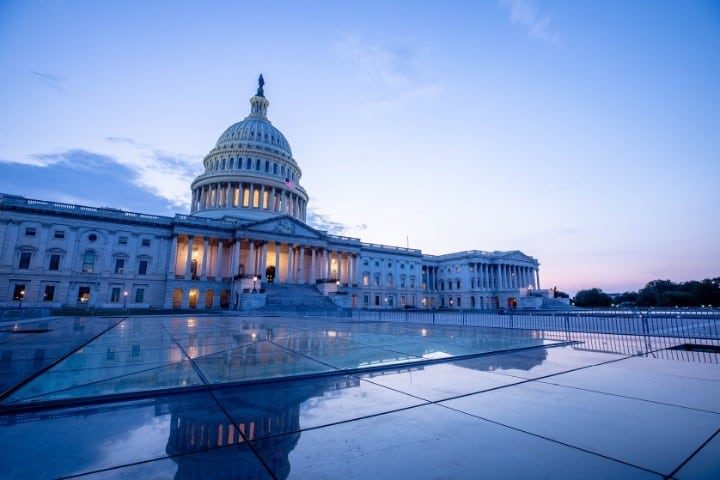
Lawmakers returned to Capitol Hill on Monday to begin work on a busy post-election lame-duck agenda that includes the National Defense Authorization Act (NDAA), Respect for Marriage Act, a bill to reform the Electoral Count Reform and Presidential Transition Improvement Act of 2022, and setting the debt ceiling.
The Democrats, who will most likely lose control of the House, are eager to get as much done and passed before this session of Congress ends to avoid potential legislative gridlock with Republicans controlling the congressional legislative calendar next year. This lame-duck session will be one to watch closely as Biden’s woke agenda is in jeopardy, especially if his leftist colleagues can’t get their bills to his desk before the session ends on January 3.
Senate Majority Leader Chuck Schumer (D-N.Y.), told reporters at a press conference Sunday that this end-of-year session will be “as productive a lame-duck session as possible” and told his colleagues to be prepared to work “long hours.”
The Respect for Marriage Act, a bill that would codify same-sex marriage into federal law, needs at least 10 Republican votes in the Senate to avoid a filibuster. The bill currently has bipartisan support, and after a procedural vote scheduled for Wednesday, the legislation is likely to pass later this week, or after Thanksgiving recess.
MSN, reporting on the bill, shared that “Senators Rob Portman, R-Ohio, Tammy Baldwin, D-Wis., Susan Collins, R-Maine, Kyrsten Sinema, D-Ariz., and Thom Tillis, R-N.C., released a joint statement Monday saying that through “bipartisan collaboration, we’ve crafted commonsense language that respects religious liberty and Americans’ diverse beliefs, while upholding our view that marriage embodies the highest ideals of love, devotion, and family.” While the bill would not force any state to recognize same-sex marriages performed within that state, it would prohibit states from not recognizing same-sex marriages from other states in which same-sex marriage is legal.
The debt ceiling, which dictates how much money the Treasury Department can borrow to meet the country’s obligations, will be reached sometime early next year. If Congress does not agree on extending the debt limit, the risk of default comes into play, and that would be disastrous for the U.S. economy. The current debt cap is about $31.4 trillion.
On Sunday, House Speaker Nancy Pelosi (D-Calif.) shared that Democrats will seek to extend the federal debt ceiling during the lame-duck session of Congress. Republicans have raised the prospect of using the debt limit as leverage to force Democrats to agree to spending cuts, but Democrats are hopeful they can come to agreement in the next few weeks to avoid a crisis.
Speaking on ABC’s This Week, Pelosi responded to potential Republican threats on the extension of the debt ceiling, stating, “We’ll see what they contend that they want to do,” adding, “but our best shot, I think, is to do it now.”
Senator Elizabeth Warren added to the debt-ceiling dilemma, sharing that “congressional Democrats should use the upcoming lame-duck session to eliminate the U.S. debt ceiling for good, warning that leaving the borrowing limit intact gives Republicans an opening to hold the economy hostage.”
Voting on the 2023 NDAA has already passed the House and awaits what should be easy passage in the Senate during the next few weeks. The Senate amendment to the NDAA reportedly “authorizes $817 billion for the Department of Defense (DOD) and $29 billion for national security programs within the Department of Energy (DOE). It authorizes critical investments in military technology, strengthens capabilities, delivers a 4.6 percent pay raise to America’s service members, and ensures they have the support, equipment, and training they need.”
As for the Electoral Count Reform Act of 2022, both of the Democrat-controlled chambers may just push their version of the act through during the lame-duck session. The legislation is ostensibly designed to safeguard future presidential elections, and was brought forth to make a repeat of January 2021 more difficult. The House has passed its version of the bill and now waits for the Senate to do the same.
If the Election Reform Act were to become law, it would make four notable changes to the electoral process, according to John P. Pelissero, Ph.D., senior scholar at the Markkula Center for Applied Ethics at Santa Clara University.
The notable changes are:
- It would require that each state’s governor be the only official who can submit the certified slate of that state’s electors and votes.
- It would affirm that the vice president’s only role in the electoral count is to preside over the joint meeting of Congress in which the votes are announced.
- It would raise the requirement to object to state electors’ votes being counted from the current rule of one member of Congress to at least one-fifth (or even one-third) of the combined House of Representatives and Senate (535 members).
- It would remove the possibility that a state legislature could attempt to install an alternative slate of electors by declaring a “failed election” in that state.
No one knows how this year-end lame duck session will end. What is apparent is that the Democrats are definitely expressing a sense of urgency to get as much to Biden’s desk as possible, knowing this may be their last chance to force their agenda into law. However, the clock is ticking for lawmakers as they have just three legislative weeks to, at the very least, fund the government and pass the NDAA.




